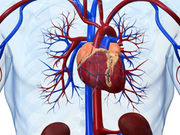Positive effect seen only on carotid-artery intima-media thickness
THURSDAY, March 31, 2016 (HealthDay News) — Oral estradiol therapy is associated with less progression of subclinical atherosclerosis in postmenopausal women when therapy is initiated early in menopause, according to a study published in the March 31 issue of the New England Journal of Medicine.
Howard N. Hodis, M.D., from the University of Southern California, Los Angeles, and colleagues randomly assigned 643 healthy postmenopausal women to receive either oral 17β-estradiol (1 mg per day, plus progesterone [45 mg] vaginal gel administered sequentially for women with a uterus) or placebo (plus sequential placebo vaginal gel for women with a uterus). Change in carotid-artery intima-media thickness (CIMT) was measured every six months.
The researchers found that among women who were less than six years past menopause at the time of randomization, the mean CIMT increased significantly more per year in the placebo group than in the estradiol group (P = 0.008). The rates of CIMT progression in the placebo and estradiol groups were similar (P = 0.29) among women who were 10 or more years past menopause at the time of randomization. There were no differences between the placebo and estradiol groups in either post-menopause stratum with regard to computed tomography measures of coronary-artery calcium, total stenosis, and plaque.
“Oral estradiol therapy was associated with less progression of subclinical atherosclerosis (measured as CIMT) than was placebo when therapy was initiated within six years after menopause but not when it was initiated 10 or more years after menopause,” the authors write.
Full Text (subscription or payment may be required)
Editorial (subscription or payment may be required)
Copyright © 2016 HealthDay. All rights reserved.








